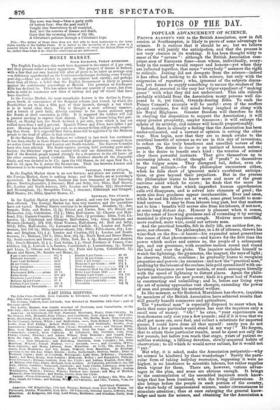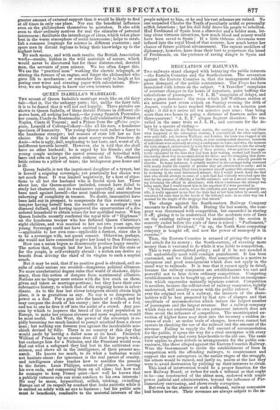TOPICS OF THE DAY.
POPULAR ADVANCEMENT OF SCIENCE.
PRINCE ALBERT'S visit to the British Association, now in full session at Southampton, is likely to prove of some advantage to science. It is curious that it should be so ; but we believe the event will justify the anticipation, and that the process is not very obscure in its working.. It has been thought witty to sneer at the " savans " : although the British Association com- prises men of European fame—men whom, individually, every- body in the country would respect and honour—yet when they are collected together, that same " everybody " assumes the right to ridicule. Jesting did not derogate from the science—indeed it has often had nothing to do with science, but only with the exigencies of reporters • who, ignorant of the subjects discus- sed, yet forced to supply something to amuse the readers of the broad sheet, resorted to the easy but vulgar expedient of" making game" with what they did not understand. This idle ridicule probably withheld from the Association many persons well dis- posed to it, yet timid, Grundy-fearing folks. To such the Prince Consort's example will be useful : even if the scoffers should continue, few will mind being laughed at along with his Royal Highness. Greater freedom will therefore be felt in obeying the disposition to support the Association; it will enjoy greater prosperity, ampler resources ; it will enlarge the sphere of its activity, and science will benefit proportionably.
Indeed, there is already a feeling that the Association has been
under-estimated, and a current ot opinion is setting the other, way. Men begin now that they are so much awake to the practical benefits of science as we are in this day of inventions, to reflect on the truly beneficent and unselfish nature of the pursuit. The desire to know is an instinct of human nature; so is the desire to benefit one's kind : the votaries of science obey these powerful instincts. They give themselves up to unceasing labour, without thought of ' profit " to themselves in the vulgar sense. They disregard toil, defeat, even ob- loquy and ridicule,—for the philosopher encounters either, when he falls short of ignorant men's exorbitant anticipa- tions, or goes beyond their prejudices. But in the process the philosopher learns to know more and more of the great universe amid which he exists ; he finds that the more he knows, the more that which imperfect human apprehension calls evil disappears, and is solved into elements of good ; the more also does goodness appear inexhaustible. Ever and anon, while he and his fellows are at work, some great benefit to man- kind accrues. It may be from labours long past, but that matters not to him : benefits will accrue also from his labours, if not now, at some long distant day. Honour is pleasant when it comes, but the sense of knowing goodness and of extending it by serving mankind is always happiness enough. Motives more unselfish, more exalted, more wise, could not actuate man. And the practical benefits, felt in daily life, are neither few, re- mote, nor obscure. The philosopher, in a fit of idleness, throws his wine-flask on the fire—it bursts—his expanded mind generalizes the cause of that phmnomenon—and knows for the first time the power which makes and carries us, the people of a subsequent age' and our greatness, with ceaseless motion round and round the land and over the globe. The inquirer secludes himself to watch the lightning, the gymnotus, the magnet, the rays of light; he observes, thinks, combines ; he gradually learns to recognize properties and powers ; he enounces : and now the "practical man, profiting by the labours of the recluse, bids gold spread itself with un- devirting exactness over baser metals, or sends messages literally with the speed of lightning to distant places. Again the philo- sopher interrogates the new power ; finds it a great tool of Nature in constructing and unbuilding; and lo, before our living eyes the art of mining approaches vast changes, extending the power of man and promoting his material welfare.
In like manner, as Sir Roderick Murchison has shown, inquiries by members of the British Association have achieved results that will greatly benefit commerce and agriculture.
The "practical man" is especially disposed to sneer when he finds that some particular operation has cost the inquirers only a small sum of money. " Oh ! " he cries, "your experiments on iron-furnaces only cost you a few nounds ; and if it is true that we shall get more ore, save fuel, and 'collect a substitute for imported guano, I could have done all that myself: surely you do not think that a few pounds would stand in my way ? " He forgets, that to attain these particular results, must be spent not only the few pounds, but before you reach that stage years of patient re- sultless watching, a lifelong devotion, slowly-acquired habits of observation ; to all which he would never submit, for it would not pay!, But why, it is asked, make the Association peripatetic—why let science be hindered by these wanderings ? Surely the parti- cular form of taking holyday recreation, supposing it were no higher, is no hindrance to scientific labours, but rather supplies fresh vigour for them. There are, however, various advan- tages in the plan, and some are obvious enough. It brings to the contemplation of the assembled inquirers much know- ledge that has been localized, with the living illustrations. It also brings before the people in each portion of the country, the whole body of impersonated science, under circumstances to stimulate attention ; thus at once enlarging the general know- ledge and taste for science, and obtaining for the Association a greater amount of external support than it would be likely to find at all times in only one place. Nor can the beneficial influence even on the philosophers themselves be mistaken. It also adds even to their ordinary motives for zeal the stimulus of personal intercourse ; facilitates the interchange of ideas, which takes place best in the warm atmosphere of social intercourse; helps to estab- lish a common language for science in different countries ; and spurs men in distant regions to bring their knowledge up to the highest level.
By such means, and with such results, the British Association • works—results, hidden in the wild materials of nature, which would never be discovered but for those disinterested, devoted men, the servants of pure science. We too often forget this. We see the "practical man" working the electric telegraph, or stirring the furnace of an engine, and forget the philosopher who gave life to mechanism ; or remember him only to laugh at his poring over wires and covering paper with calculations. How- ever, we are beginning to know our own interests better.



























 Previous page
Previous page